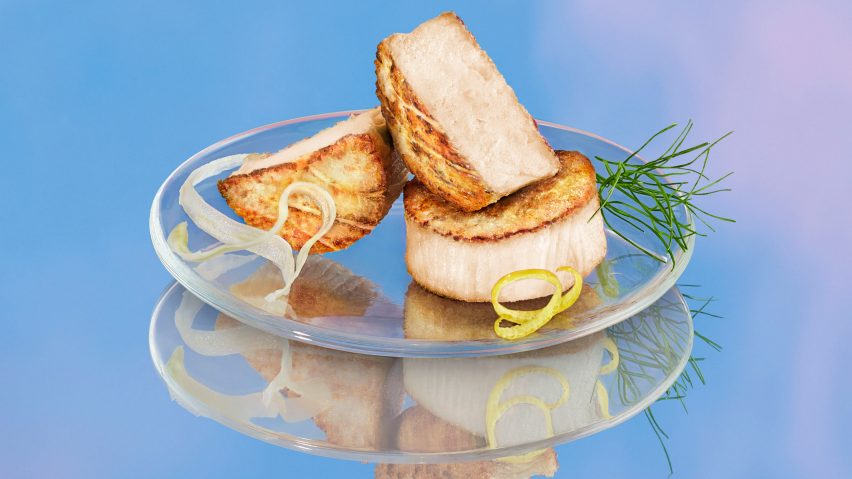California-based startup Air Protein has developed a meat alternative called Air Meat, which is made using microbes that turn recycled carbon dioxide into protein.
Described by Air Protein as "the meat of tomorrow", Air Meat was designed to replicate the flavour and texture of real meat products such as steak.
"Our vision is to build the first carbon-negative meat company"
While beef generates 70 kilograms of greenhouse gas emissions for every kilogram produced, while also causing widespread deforestation, Air Protein founder Lisa Dyson claims that its protein production emits far less carbon and doesn't require land or animals.
"We look at the analysis from cradle to gate, prior to when the product is consumed," she told Dezeen. "On this basis, our vision is to build the first carbon-negative meat company."
Air Protein is among a number of companies, including Finland-based Solar Foods, that are making meat and dairy substitutes from captured emissions in a bid to mitigate the climate impact of agriculture.
However, Air Protein's process makes use of CO2 captured from factories rather than from the atmosphere.
In the future, the company is planning to use direct air capture units to remove CO2 directly from the air.
But regardless of where it comes from, the carbon contained in the steak ultimately reenters the atmosphere after being eaten, as the consumer exhales it as carbon dioxide through the process of respiration.
This means Air Protein's meat alternative doesn't directly reduce the concentration of CO2 in the atmosphere. Instead, Dyson says its climate potential lies in avoiding emissions and resource use elsewhere.
"The amazing thing about our process is that it can be located virtually anywhere in the world, with no arable land required at all," she said.
Fermentation process mimics yoghurt production
Air Meat was developed using research on converting carbon dioxide into food for space travel that was conducted by NASA in the 1960s.
This found that certain microbes could convert carbon dioxide released by astronauts into a protein when combined with water and energy.
Air Protein makes use of this same process in its manufacturing facility, where the microbes are grown in bioreactors powered by solar and wind energy, hydrogen and oxygen and captured industrial emissions.
The protein is then purified and dried, resulting in a "protein-packed flour" called Air Protein. The company likens the process to yoghurt, cheese or beer fermentation.
"Elements of the air are whisked together with cultures to produce protein – a process similar to how yoghurt and cheese are made," Dyson.
"Think of whey protein, a product of fermentation – we make a similarly protein-rich flour however, instead of using milk as an input, our inputs are air, water and renewable power."
"It features more protein per kilogram than any other meat source"
After the Air Protein is created, ingredients and flavours are added to the mixture to make it taste and feel like traditional beef, although the recipe can also be tailored to resemble chicken, pork or seafood.
According to Dyson, making an alternative that meat-eaters will like too is the main challenge for encouraging mass adoption. The company is currently refining how to make its options similar to traditional meats on supermarket shelves.
This includes experimenting with different oils and nutrients to alter taste and flavour.
"We have a mission at Air Protein to accelerate the world's transition to climate and rainforest-friendly meat and that mission requires us to make products that meat-eaters love," she explained.
"For that reason, we are focused on delivering taste, texture and nutritional outcomes that will make the environmentally-friendly choice the easy choice."
Dyson claims that the resulting alternative meat has additional health benefits in comparison to animal meat.
"The substance has no soy, hormones, pesticides, herbicides or genetically modified organisms," she said. "It features more protein per kilogram than any other meat source and is rich in vitamins, minerals and amino acids."
Agriculture emissions to grow by 80 per cent
Air Protein's parent company Kiverdi has more than 50 patents granted or pending for its technology and is currently working on scaling up production of the air-based protein to make the product commercially available.
The development of Air Meat comes as meat consumption continues to increase. Agriculture and forestry make up about 24 per cent of global greenhouse gas emissions and these are predicted to grow by 80 per cent by 2050, as demand for meat and dairy increases.
Meanwhile, an Intergovernmental Panel on Climate Change report from August 2021 concluded that although carbon dioxide is the most important contributor to human-induced global warming, methane is the next most significant.
Cows and other ruminant livestock are the single largest source of methane, accounting for around a quarter of emissions.
Due to growing environmental concerns over mass animal farming and its effects on the planet, more companies are racing to develop meat alternatives.
Food-tech startup Aleph Farms has developed a lab-grown steak made from cow cells while Novameat has created a 3D-printed steak from vegetable proteins.

